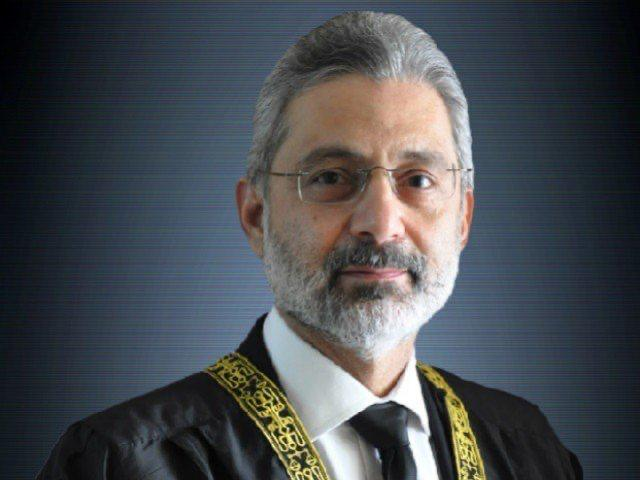Justice Isa's wife challenges SC June 19 short order
Sarina Isa says split order is discriminatory; singles out judges’ family

Justice Qazi Faez Isa’s wife, Sarina Isa, has filed a review petition against the Supreme Court’s June 19 short order, contending that the split order is discriminatory as it singles out Justice Isa’s family from a newly created “class of persons”.
"By issuing orders under Article 184(3), the Honourable Supreme Court has, effectively, created a class of persons and redefined the private and confidential affairs of individual citizens falling within such class as matters of ‘public importance’," said the petition filed under Article 188 of the Constitution.
A ten-judge full court on June 19 quashed a presidential reference that accused that Justice Isa had committed misconduct by not disclosing his family member’s foreign properties and sought his removal.
In the split order, seven of the judges had, however, referred the case to the Federal Board of Revenue (FBR) and ordered the tax authority to launch an inquiry into foreign assets of Justice Isa’s family
The short order had asked the FBR chairman to present a report on basis of the inquiry to the Supreme Judicial Council (SJC), the constitutional forum that can hold a superior court judge accountable, and the SJC, according to some legal expert, could revive the reference and initiate proceedings against Isa.
On Monday, Sarina Isa, Justice Qazi Faez Isa and the Pakistan Bar Council (PBC) filed separate appeals against the June 19 order. Some other lawyer bodies, including the Supreme Court Bar Association (SCBA), have also filed review petitions.
Challenging the short order, Sarina Isa said the new class of people that the SC order has created includes the spouses and children of judges, with their assets and liabilities being elevated to the status of public importance impinging on the fundamental rights of all citizens of Pakistan.
She said the creation of such a class backed by a judicial order without any foundation in law may be seen to be invidious and discriminatory. The petitioner said under Article 194 of the Constitution, all judges of the superior courts take the same oath, under the third schedule.
“All judges of the superior courts abide by the same code of conduct, and their violation of the same is dealt with by the same forum, the SJC, under Article 209 of the Constitution.
“However, it is to the exclusion of all other members of this class, created by the Supreme Court under Article 184(3), that the petitioner and her children are being singled out and targeted.”
The petitioner said she and her children are being made to explain their sources of income to the exclusion of the spouses and children of all 139 sitting chief justices and judges of the superior courts.
It is a settled law, she said, that persons similarly situated are to be treated in the same manner.
"[However] in the instant matter, it is clear that only one individual judge of a class created by [SC] is being dealt with in a manner completely different to the other members of the same class in a brazen violation of the right to equal protection and guarantee against discrimination under Article 25.
“There is no basis to treat the petitioner any differently from the spouses of all other judges of the superior courts and the petitioner’s children from the children of all other judges of the superior courts".
The petition said if the Supreme Court has decided that accountability of judges mandates accountability of their spouses and their children and that the spouses and children of judges must present themselves before the FBR to obtain a character certificate of good legal and moral conduct, the obligation to do so cannot attach to the petitioner and her children alone.
“Nor will they be so obliged merely because the elusive Mr Dogar in some inexplicable fashion mentioned the assets belonging to the petitioner.” Abdul Waheed Dogar was the man on whose complaint the government moved the reference against Justice Isa.
"If a new obligation has been created for the petitioner due to her being the spouse of a judge, such obligation must be applied and enforced strictly across-the-board in relation to all members of this new class of judges’ spouses and children.
“And, would it also not be eminently fair to include the chief justices and judges who have retired, after all they receive pensions and other benefits, and particularly the honourable chief justice and an honourable judge of the council [SJC] who were satisfied on this ground to issue show cause notice with regard to the references against Justice Isa," she added.
Sarina Isa alleged that the tactics employed by the PTI led federal government, the FBR, and FBR commissioner Inland Revenue Zulfiqar Ahmad conclusively establish that a charade is being enacted.
“There is no chance of expecting an order passed [by the FBR] in accordance with the provisions of the Income Tax Ordinance and one which meets the basic tenets of justice,” she said.
She said the short order recognises the petitioner’s right of appeal under the Income Tax Ordinance.
“Therefore, assuming there is an order passed by the Commissioner Mr Zulfiqar Ahmad, who serves the interest of Mr Imran Khan’s government, and on the basis of this order the council [SJC] proceeds against Justice Isa and removes him, but subsequently the petitioner succeeds in appeal before the FBR or before the high court/Supreme Court and the very basis of Justice Isa’s removal is rendered void, illegal, unlawful or unconstitutional, it would create an anomaly which could not be redressed.
“Probably by then Justice Isa would have attained the age of 65 years and the executive would be gladdened that what they could not achieve directly they nonetheless managed to achieve indirectly,” she added.



















COMMENTS
Comments are moderated and generally will be posted if they are on-topic and not abusive.
For more information, please see our Comments FAQ